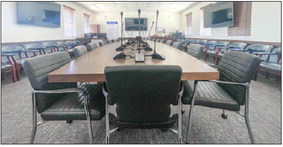Reserve study and 2025 budget must be approved by the end of October
GRF PRESIDENT'S COLUMN
by Janet Isom
GRF President
Our overarching goal during this budget season is to increase our income and decrease our expenses. It is not always as easy as it sounds. As the GRF Board closes in on finalizing the 2025 Reserve Study and Annual Budget, there are some external budgetary pressures that we simply cannot control. These major cost drivers include: inflation, cost of utilities, insurance premiums, minimum wage increase, etc. Near the end of this month we will have a better understanding and grasp of what our monthly assessments will be in 2025, both for GRF and all of the Mutuals.
Please join us at our monthly GRF Board meeting on Tuesday, Oct. 22, at 10 a.m. in Clubhouse 4. There will also be a special open meeting of the Board on Thursday, Oct. 24, at 10 a.m. in Clubhouse 4 to vote to approve the 2025 Reserve Study and 2025 Annual Budget.
Both the Reserve Study and Annual Budget must be approved by the end of October in order to meet California Civil Code 5300 mailing requirements. The Annual Budget Report and Annual Policy Statement must be mailed at least 30 days before the end of the association’s fiscal year to all GRF Members. It is the responsibility of each GRF Member to provide up-to-date Contact Information to GRF (Civ. Code § 4041.).
Upon written consent of members, associations may distribute documents and disclosures electronically; otherwise, all documents must be distributed by “First-class mail, postage prepaid, registered or certified mail, express mail, or overnight delivery by an express service carrier” (Civ. Code § 4040.).
Oftentimes, references will be made to “Davis-Stirling” or the
GRF BUDGET, page 2 GRF BUDGET
from page 1
Civil Code without explanation of what the speaker means. The Davis-Stirling Common Interest Development Act, commonly known as the “Davis-Stirling Act,” is the section of California law that specifically regulates community associations (like GRF and the 16 Mutual Corporations). The act was originally passed in 1985 and amended in 2014, when it was reorganized and recodified, replacing the “old code” with Civil Code Sections 4000-6150.
The Davis-Stirling Act applies to all community associations, regardless of when they were developed. The intention of the Act is to provide safeguards for members within community associations and to allow for selfgovernance by elected board of directors. The act includes regulation on many issues, including finances, insurance, elections, communication with members, dispute resolution, and operations.
The Board welcomes your suggestions and comments: email GRFBoard@lwsb.com or dropped off with the front desk staff or into the outdoor slot on the far right of the Administration Building.





